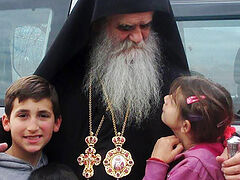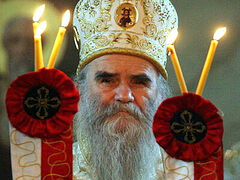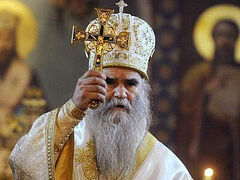He was a man of prophetic gifts and the Gospel power of forgiveness. He loved even his enemies who rose up against him; and broken by his love, many eventually repented and became his co-workers! Relying on the support of believers or people who converted with repentance, he launched his most extraordinary missionary activity very quickly. He visited many institutions, communicated with youth and restored churches. Everything around him throbbed with life. He did not just restore or build churches (this was not an end in itself for him), but he used each construction site as an occasion for a mission—returning people to God. It was in the process of his building activity that many people got to know each other, became close in Christ—and this is how communities of churches under construction were formed. Only a man of great courage and charisma as Metropolitan Amfilohije could undertake the construction of the huge monumental churches that we see as a result of his ministry—for example, in Podgorica and other cities of Montenegro. The Lord vouchsafed him to bless many churches and to see with his own eyes his people returning to the faith of their ancestors.
Not only did he restore churches, he regenerated people’s memories and brought them back to their roots. He brought Montenegro back to itself. In addition to opening many churches and monasteries, he founded a theological seminary, launched many church print media and radio programs, and set up a diocesan publishing house. All his undertakings contributed to the spiritual upliftment of Montenegro. And his enemies raged in response to the fact that Vladyka Amfilohije’s pastoral successes multiplied! They sought in every possible way to find new ways to harm him and his mission.
In 2005, on the top of Mt. Rumija, with the help of a military helicopter, Vladyka Amfilohije erected a small church of the Holy Trinity. This caused such a hostile reaction, it was as if satan himself had bared his fangs. That was followed by another flurry of accusations against the archpastor by the Montenegrin authorities through the biased press. In fact, there used to be a church on that mountain, and the Orthodox had the tradition of climbing to its peak and praying. Many Muslims had already settled around this place—a fact that was used as an excuse to accuse the metropolitan of inciting religious hatred by building an Orthodox church. This campaign against Vladyka Amfilohije lasted for several weeks. There was such an antagonistic atmosphere escalating in Montenegro that some called for the hierarch’s execution. But remarkably, that did not affect him in any way—his courage only increased.
I have mentioned this episode as an example of how over all those thirty years of his archpastoral ministry in Montenegro, the atheists waged an unceasing war against him. Sometimes it would calm down a little, but then furious waves would rise again on the raging hellish sea of the passions. That confrontation constantly made itself felt. But Vladyka was aware that God alone has the power to calm any storms. He held tightly on to Christ. When asked: “How could Vladyka endure all this while maintaining such bright optimism that radiated to everyone around him?” I answered that he was a real man of prayer, an ascetic. Almost every day he celebrated the Holy Eucharist. The Divine Liturgy was the essence and heart of his archpastoral ministry. The most important thing for him was to bring people to the Holy Chalice, to share the Body and Blood of the Lord with everyone so that everyone would be united in Christ. In this way, as he taught, through the participation in services and the holy sacraments, the Church is reconstituted and built in us and from us as the Body of Christ. So he drew his pastoral energy primarily from church services, while standing at the holy altar.
At the same time, he was a man of profound, quiet, personal inner prayer. Whenever he was in the epicenter of monstrous hurricanes (and he had many), he would retire to pray, going deeply inside himself. So he withstood. And he prayed not only for himself and his flock, but also for his enemies, blessing, according to the Lord’s commandment (Mt. 5:44), those who were cursing him and doing him harm. Prayer was always his most intimate rest, space for his soul, and a way to restore his strength. He soared like an eagle over all these stormy days. He never parried to any mud that his enemies slung at him through the media. He simply prayed, and this was of great benefit not only to him, but also to us, and even to those who were opposed to him. He always returned after immersion in prayer with new, fresh energy—joyful, cheerful, and as determined as ever to do good. He would be ready to continue his archpastoral duties with triple strength. He won enormous confidence among the people.
He was a real pillar of the Church, an apostle of Christ—fearless and unbending. Clergy and monastics felt that at the head of the Church was a man who always won and was able to overcome everything with God’s help. It filled everyone with enthusiasm. It was by his total trust in God that he was irresistible. By his example, we have seen with our eyes what these words of the Apostle Paul mean: I can do all things through Christ which strengtheneth me (Phil. 4:13).
As an archpastor and clergyman Metropolitan Amfilohije did not gather people around himself—he brought them to Christ. He did not have any specific norms or criteria for choosing who to talk to and who not to talk to. He accepted everyone! He had a huge number of spiritual children; they are all very different, strikingly different from each other. He shouldered burdens of exorbitant weight—so many spiritual children, and each one had his own shortcomings, passions, illnesses, sorrows, needs and problems. He listened to everyone and understood them. He gave more attention to weak ones, as they required special sacrifice. And he pushed forward those whom he considered stronger so that they could carry their crosses themselves. He just pushed people to freedom: “If you have strength, serve the Lord! With all your heart! And even if you have no strength, still serve Him, and God will give you everything you need!” For all of us he was a model of how you can offer your whole being to the Lord as a fragrant offering. He did not refuse to help anyone, but made it clear how much more blessed it is to give up yourself and turn yourself into the Lord’s bread for others. He taught us the celebration of this essential spiritual Eucharist.
It was around this inner work of Christians—the assimilation and implementation of Christ’s teaching—that more and more parishes and monasteries grew up. He gathered a whole host of Christ’s followers—monastics, priests and zealous laypeople. All these were his faithful helpers. We can say that he rebuilt Montenegro spiritually and renewed its spirit. And the enemies fought against him incessantly. Besides holding the power in Montenegro, they had many henchmen.
At the end of his life, Vladyka Amfilohije faced one of the biggest temptations in his life. The powers that be tried to divide the people, assuming they would stay in power: they divided and ruled. And Vladyka Amfilohije was perhaps the only one who could so effectively unite the Montenegrins scattered over the barricades, gather those embittered and desperate into the Church, and heal wounds. As a result, the furious authorities simply declared the Church an enemy of the State, and they wanted to do away with it once and for all. Although Communism was already a thing of the past, these heirs to the militant atheists announced a new phase of persecution against the faith of Christ. They cut off any possibility of negotiations with them. Unprecedented pressure on the Church began.
President Milo Đukanović decided to seize church property and appropriate it for the State. The authorities were also actively engaged in the creation of the so-called “Montenegrin Autocephalous Church”. Setting themselves the goal of seizing the churches, they intended to reduce the pastoral activity of the true Church of Christ to nothing. They meant to use churches exclusively as tourist sites. They wanted to stop services in them, abolish the Metropolis of Montenegro and the Littoral and declare their pocket, subservient “Autocephalous Church”. They sought to change the identity of the freedom-loving Montenegrin people, destroying their historical memory. Since this ill-fated law had already been passed, we had no choice but take to the streets. It was very dangerous. The authorities could have used this against us, accusing us once again of sowing discord in society and disrespecting the laws of our State... But at the head of our movement, which had spread nationwide, was a wise and holy man—Metropolitan Amfilohije. He called on the people to pray to the Lord Almighty. At first, we began to hold small cross processions around our churches, until all this resulted in huge processions in all cities and villages of Montenegro.
We were ready to go up the Golgotha of Christ. Vladyka Amfilohije never swerved in his life; he walked straight—and the path of every Christian always leads to his own Golgotha. And we followed our archpastor. He was crucified with Christ (cf. Gal. 2:19) all his life, and we learned Christian selflessness from him. And everyone around felt the inner strength of this God-given life for Christians and joined us. People of various views and political preferences walked together, but at that time they all felt the injustice that was being imposed on our people, and so they took to the streets to protest. For many this was the beginning of their life in the Church. Thus, the enemy was as always put to shame. People united and were imbued with a sense of their right to decide everything together, to overthrow the deceit and malice of officials. It was the nation’s real spiritual revival. Metropolitan Amfilohije led the people to God. He strengthened people by always holding a cross in his hand. He used to say: “We are walking to Christ’s victory.” And so we overthrew those who were at war with the Church of Christ. The next elections showed which side the people were on.
 Metropolitan Amfilohije’s funeral
Metropolitan Amfilohije’s funeral
This was the last, but the most significant victory of Metropolitan Amfilohije. After that he contracted the coronavirus. I remember being amazed when he said, just having been infected: “So I, too, have caught this virus and now have the opportunity to sympathize with all the millions of people whom this disease has taken.” The largest cross procession—a stunning gathering of people—came to his coffin when he reposed. And people, despite all the epidemiological restrictions, came to bid farewells to their father and archpastor, and show their love and gratitude to him.
 Metropolitan Joanikije (Micovic) Until his blessed repose, no one had ever seen Vladyka Amfilohije tired. He stood to the end. Trees die standing. His irrepressible temperament allowed him to carry out tectonic transformations for the better in this world. Until his very last days he had something so young in his appearance and eyes—the ardor which only young men have. He retained this boldness and daring until very old age. He remained a pure, rejoicing child until his very end—gentle, kind and simple. He did not depart to the Lord, but rather flew off to His Kingdom like an eagle, which in its lifetime soared over all the disorder of this world and then gained new height. And from Heaven he continues to bless his Montenegro and his people. His voice, his words about Christ’s victory strengthen us all today.
Metropolitan Joanikije (Micovic) Until his blessed repose, no one had ever seen Vladyka Amfilohije tired. He stood to the end. Trees die standing. His irrepressible temperament allowed him to carry out tectonic transformations for the better in this world. Until his very last days he had something so young in his appearance and eyes—the ardor which only young men have. He retained this boldness and daring until very old age. He remained a pure, rejoicing child until his very end—gentle, kind and simple. He did not depart to the Lord, but rather flew off to His Kingdom like an eagle, which in its lifetime soared over all the disorder of this world and then gained new height. And from Heaven he continues to bless his Montenegro and his people. His voice, his words about Christ’s victory strengthen us all today.




